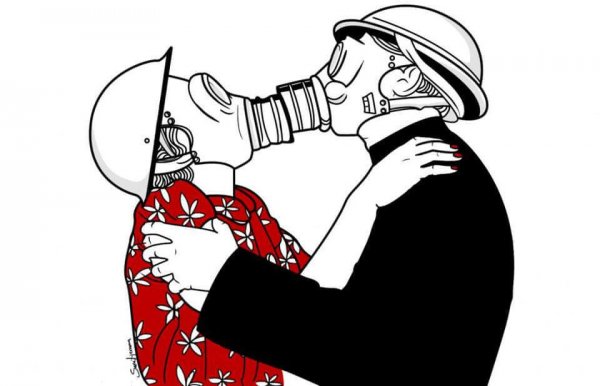The Danger of Calling Someone a "Toxic Person"

The problem is that it makes it easier for us to feel like victims: a very tempting idea, of course. That’s why it’s such a tempting resource for emotional slackers or people who think they’re perfect. And for people who think a “toxic person” doesn’t deserve any empathy.
These last people don’t want to see a person’s toxicity as a reaction to a complex situation and past. They’d rather think it’s inherent. In other words, a person who uses the label of “toxic person” is unaware that this toxicity, if it exists, has a history.
Another reason we should be careful with the label “toxic person” is that it’s not a scientific label. There are no studies on toxicity.
There are studies of behavior that people later label as toxic. They do it “a posteriori,” and without taking into account many of the variables that cause these behaviors.
In fact, the label is now so popular that there’s a serious chance it might be used against us. No one is safe from being put into the “toxic person” box. It’s a short step from labeling behaviors to labeling people.
Why Has the Label “Toxic Person” Left Such a Mark?
Calling someone toxic isn’t harmless. In fact, it could be a very serious attack. A cruel insult disguised in moral authority you might get from flipping through a couple self-help books.
The term toxic is easy to understand. It gets its strength from sounding like poison. In our imaginations, it suggests a dangerous substance we have to be very careful with. So when we say something is toxic, we’re saying we shouldn’t trust it.

It’s a shame that the weapon of this harmful label is in so many people’s ignorant hands. It merits some reflection…
There Are No Toxic People, Just Toxic Relationships or Behaviors
No one is toxic in and of themselves.
Human beings don’t have arsenic in place of blood. Sometimes we’re a calm sea, where the sails and rudder seem to line up and carry us where we want. But other times we just feel the storm, without ever seeing the water. A storm we quite often feed, lead, or pass on.
In life, our expectations, ways of behaving, and values will clash with those of the people around us. Feeling that emptiness and uncertainty, we might opt for isolating that emotional emptiness. Instead, we let our responsibility fall on the other person.

Maybe we need to do some introspection and a bit of work on ourselves first before thinking about calling anyone else a “toxic person.”
Toxic Dynamics Instead of Toxic Person
Everyone can be a victim of toxic behavior. But, it’s more common for us to participate in toxic dynamics, and not for us to be toxic people.
We do it when, out of pride, we don’t talk to someone because they won’t talk to us. When we insist on a topic just to highlight the other person’s ignorance. When we become dependent because the other person is very overprotective.
You can see that the term toxic is as powerful as it is imprecise. Saying someone is a toxic person only indicates they’re dangerous or potentially so. It doesn’t say how they’re dangerous, what aspects they affect, how we can protect ourselves if necessary.
And it doesn’t even touch how we might help them. Let’s stop labeling people and see them for the individuals they are.
The problem is that it makes it easier for us to feel like victims: a very tempting idea, of course. That’s why it’s such a tempting resource for emotional slackers or people who think they’re perfect. And for people who think a “toxic person” doesn’t deserve any empathy.
These last people don’t want to see a person’s toxicity as a reaction to a complex situation and past. They’d rather think it’s inherent. In other words, a person who uses the label of “toxic person” is unaware that this toxicity, if it exists, has a history.
Another reason we should be careful with the label “toxic person” is that it’s not a scientific label. There are no studies on toxicity.
There are studies of behavior that people later label as toxic. They do it “a posteriori,” and without taking into account many of the variables that cause these behaviors.
In fact, the label is now so popular that there’s a serious chance it might be used against us. No one is safe from being put into the “toxic person” box. It’s a short step from labeling behaviors to labeling people.
Why Has the Label “Toxic Person” Left Such a Mark?
Calling someone toxic isn’t harmless. In fact, it could be a very serious attack. A cruel insult disguised in moral authority you might get from flipping through a couple self-help books.
The term toxic is easy to understand. It gets its strength from sounding like poison. In our imaginations, it suggests a dangerous substance we have to be very careful with. So when we say something is toxic, we’re saying we shouldn’t trust it.

It’s a shame that the weapon of this harmful label is in so many people’s ignorant hands. It merits some reflection…
There Are No Toxic People, Just Toxic Relationships or Behaviors
No one is toxic in and of themselves.
Human beings don’t have arsenic in place of blood. Sometimes we’re a calm sea, where the sails and rudder seem to line up and carry us where we want. But other times we just feel the storm, without ever seeing the water. A storm we quite often feed, lead, or pass on.
In life, our expectations, ways of behaving, and values will clash with those of the people around us. Feeling that emptiness and uncertainty, we might opt for isolating that emotional emptiness. Instead, we let our responsibility fall on the other person.

Maybe we need to do some introspection and a bit of work on ourselves first before thinking about calling anyone else a “toxic person.”
Toxic Dynamics Instead of Toxic Person
Everyone can be a victim of toxic behavior. But, it’s more common for us to participate in toxic dynamics, and not for us to be toxic people.
We do it when, out of pride, we don’t talk to someone because they won’t talk to us. When we insist on a topic just to highlight the other person’s ignorance. When we become dependent because the other person is very overprotective.
You can see that the term toxic is as powerful as it is imprecise. Saying someone is a toxic person only indicates they’re dangerous or potentially so. It doesn’t say how they’re dangerous, what aspects they affect, how we can protect ourselves if necessary.
And it doesn’t even touch how we might help them. Let’s stop labeling people and see them for the individuals they are.
This text is provided for informational purposes only and does not replace consultation with a professional. If in doubt, consult your specialist.







